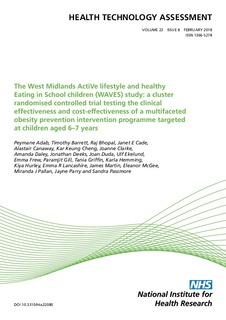The West Midlands ActiVe lifestyle and healthy Eating in School children (Waves) study: a cluster randomised controlled trial testing the clinical effectiveness and cost-effectiveness of obesity prevention intervention programme targeted at children aged 6-7 years
Adab, Peymane; Barrett, Timothy; Bhopal, Raj; Cade, Janet E.; Canaway, Alastair; Cheng, Kar Keung; Clarke, Joanne; Daley, Amanda; Deeks, Jonathan; Duda, Joan; Ekelund, Ulf; Frew, Emma; Gill, Paramjit; Griffin, Tania; Hemming, Karla; Hurley, Kiya; Lancashire, Emma R.; Martin, James; McGee, Eleanor; Pallan, Miranda J.; Parry, Jayne; Passmore, Sandra
Journal article, Peer reviewed
Permanent lenke
http://hdl.handle.net/11250/2569155Utgivelsesdato
2018-02Metadata
Vis full innførselSamlinger
- Artikler / Articles [2096]
Sammendrag
Excess weight in children is associated with health, emotional and social problems. Schools offer an opportunity to promote healthy lifestyles.
This study tested whether or not a programme of activities could prevent excess weight gain in primary school children. Fifty-four schools in the West Midlands participated, with 1397 year 1 pupils (aged 5–6 years) being involved in study measurements. The WAVES (West Midlands ActiVe lifestyle and healthy Eating in School children) study healthy lifestyle programme was delivered over the next school year to children in 26 of the schools. The 1-year programme included:
- helping teachers to provide opportunities for an additional 30 minutes of physical activity (PA) in the school day
- participation in the ‘Villa Vitality’ programme (interactive learning led by Aston Villa Football Club with practical opportunities for PA and healthy eating)
- termly healthy cooking skills and education workshops for parents and children
- information to families signposting local PA opportunities.
The remaining 28 schools continued with their usual activities.
We assessed height, weight and other measures of body fat in all participating children. We also measured the children’s diet, PA levels and well-being. We took these measures before programme delivery, and again 3, 18 and 27 months after the end of the programme.
Overall, we found no major difference in any measurements between children in schools with and children in schools without the WAVES study programme. The programme was not cost-effective. However, there were no safety concerns, the programme was well received by schools and families and it was perceived to have wider benefits.
